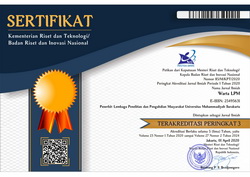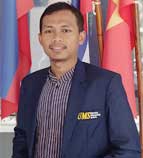Logical Framework Analysis dalam Pemberdayaan Masyarakat yang Berkelanjutan: Studi pada Program Pengembangan dan Pemberdayaan Masyarakat di PT Bukit Asam
DOI:
https://doi.org/10.23917/warta.v26i4.1727Keywords:
Community Development, Corporate, Logical Framework AnalysisAbstract
Community development and empowerment program (PPM) is form of corporate social and environmental responsibility as an effort to provide benefits to the environment around the company, especially the community. The PPM program is designed to create various positive changes in society both for the people who are around the company and society in general. In its implementation, the company needs to make clear planning, development, supervision, and monitoring of the program objectives. Logical Framework Analysis (LFA) is one of the tools used in determining management planning and industrial evaluation of the program to be implemented by identifying the relationships between existing elements to a conclusion. The purpose of this study is to describe the process of using Logical Framework Analysis which is applied and used in planning community empowerment programs in state-owned mining companies located in Tanjung Enim, South Sumatra Province, which carry out Community Development and Empowerment Programs in the manufacturing sector. Following the mandate of Law no. 40 of 2007 concerning Limited Liability Companies, companies that carry out their business activities in the natural resources sector are required to carry out Social and Environmental Responsibility. The research method used in this research is a qualitative descriptive method so that it can clearly describe the process of preparing a Logical Framework Analysis. The data collection process is carried out through in-depth interviews and focus group discussions (FGD) with stakeholders related to manufacturing, fisheries, and livestock programs. Apart from in-depth interviews and FGDs, secondary data collection was also carried out as a form of validating the data obtained directly. The research results show that LFA can be designed after analyzing the roles and interests of each relevant stakeholder, especially in the manufacturing sector, analyzing the situation, and analyzing the problems surrounding the PPM program in the manufacturing sector. PT Bukit Asam Tbk's PPM Manufacturing Program has used LFA to ensure that the program runs and can make the beneficiary communities independent of the program.
References
Berampu, A. C., & Agusta, I. (2015). Manfaat Partisipasi Masyarakat dalam Program Pengelolaan Sampah. Jurnal Penyuluhan, 11(2).
Bogdan, Robert., & Biklen, S. Knopp. (1992). Qualitative research for education : an introduction to theory and methods. Allyn and Bacon.
Colorafi, K. J., & Evans, B. (2016). Qualitative Descriptive Methods in Health Science Research. Health Environments Research and Design Journal, 9(4), 16–25. https://doi.org/10.1177/1937586715614171
Fairuza, M. (2017). Kolaborasi antar Stakeholder dalam Pembangunan Inklusif pada Sektor Pariwisata (Studi Kasus Wisata Pulau Merah di Kabupaten Banyuwangi). www.kabarbanyuwangi.com
Freeman, R. E., & Mcvea, J. (2006). A Stakeholder Approach to Strategic Management (R. Freeman & J. McVea, Eds.; 1st Edition). Blackwell Publishing Ltd.
Hidayat, D., Siahaan, E., Puspitasari, A., & Susiana. (2020). Penerapan CSR “The Green Care School Program” di Pertamina Integrated Terminal Balikpapan. MADANI Jurnal Politik Dan Sosial Kemasyarakatan, 12(2).
International Federation of Red Cross and Red Crescent Societies. (2002). Handbook for Monitoring and Evaluation (1st Edition). International Federation of Red Cross and Red Crescent Societies. www.ifrc.org
Kim, H., Sefcik, J. S., & Bradway, C. (2017). Characteristics of Qualitative Descriptive Studies: A Systematic Review. Research in Nursing and Health, 40(1), 23–42. https://doi.org/10.1002/nur.21768
Lincoln, Y. S., & Guba, E. G. (1985). Naturalistic Inquiry. Sage Publications.
Putri, N. E., & Armika, A. (2021). Analisis Logical Framework Approach terhadap Keberadaan Pasar Kalangan Desa dalam Pemenuhan Pangan Rumah Tangga di Desa Ulak Pianggu Kecamatan Pampangan Kabupaten Ogan Komering Ilir. Seminar Nasional Lahan Suboptimal ke-9 “Sustainable Urban Farming Guna Meningkatkan Kesejagteraan Masyarakat Di Era Pandemi,.”
Rindawati, M. W., & Asyik, N. F. (2015). PENGARUH PROFITABILITAS, UKURAN PERUSAHAAN, LEVERAGE, DAN KEPEMILIKAN PUBLIK TERHADAP PENGUNGKAPAN CORPORATE SOCIAL RESPONSIBILITY (CSR). Jurnal Ilmu & Riset Akuntansi, 4(6).
Riswandi, I. D. C., & Herlambang, A. (2019). Evaluasi Kinerja Pembangunan Program Kerja Base Transceiver Station (BTS) Menggunakan Logical Framework Analysis Studi Pada Badan Aksesibilitas Telekomunikasi dan Informasi (BAKTI) KOMINFO. Jurnal Pengembangan Teknologi Informasi Dan Ilmu Komputer, 3(3), 2685–2692. http://j-ptiik.ub.ac.id
Sandelowski, M. (2000). Focus on Research Methods Whatever Happened to Qualitative Description? In Research in Nursing & Health (Vol. 23). John Wiley & Sons.
Sandelowski, M. (2010). What’s in a name? Qualitative description revisited. Research in Nursing and Health, 33(1), 77–84. https://doi.org/10.1002/nur.20362
Schwalbe, K. (2014). Information Technology Project Management: Vol. 7th Edition.
Virginia, G., Susanto, B., Restyandito, & Proboyekti, U. (2018). Logical Framework Analysis dan Appreciative Inquiry dalam Perencanaan Strategis Sistem Informasi Manajemen Organisasi. Prosiding Seminar Hasil Pengabdian Kepada Masyarakat, 3(1). https://www.researchgate.net/publication/329276777
Winardi. (2019). STAKEHOLDER GOVERNANCE STRATEGY IN THE FORMULATION OF THE EXCLUSION POLICY OF LOCATED INDUSTRIAL COMPANIES IN THE INDUSTRIAL PARK. Jurnal Pemikiran Dan Penelitian Administrasi Bisnis Dan Kewirausahaan, 4(1). https://doi.org/10.24198/adbispreneur.v4i1.20746
Zastrow, C. (2017). Introduction to Social Work and Social Welfare, Empowering People (12th Edition). Cengage Learning.
Downloads
Submitted
Accepted
Published
How to Cite
Issue
Section
License
Copyright (c) 2023 Warta LPM

This work is licensed under a Creative Commons Attribution 4.0 International License.















